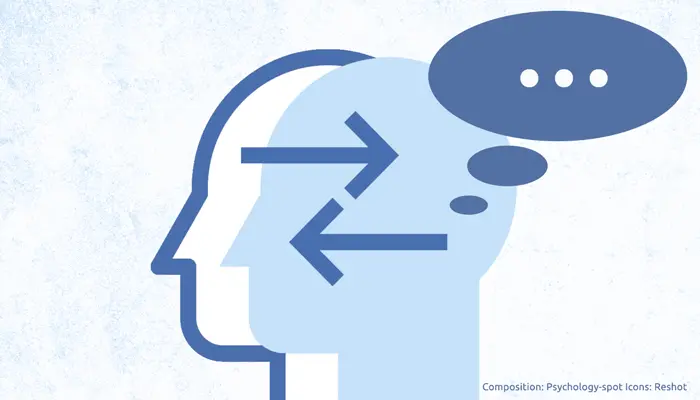
We do not usually pay much attention to our inner dialogue, but the way we refer to ourselves determines our ability to face problems, conditions our decisions and ultimately influences how we feel.
The conversations we have with ourself define us, both in front of the others and inside. Those issues we become obsessed with and the words we choose end up shaping our reality – a reality that can be more or less limited and more or less bleak depending on the course of our self-affirmations.
Of course, thinking that we will be able to face a challenge is not a guarantee that we will succeed, but telling us that we will not succeed is a guarantee of failure. That is why it is worth turning the reflectors inwards and beginning to question our internal dialogue, especially if we use a limiting language and send ourselves harmful messages that can damage our mental health.
What is the inner dialogue?
The internal dialogue is our thoughts, that voice inside our head that comments on everything that happens to us and runs almost all the time, consciously or unconsciously.
We use the word “dialogue” and not “monologue” because our inner voice tends to take advantage of our mind’s ability to unfold and imagine an interlocutor. In fact, according to the Dutch psychologist Hubert Hermans, our “ego” is composed of a multiplicity of “positions towards ourselves” that have the possibility of dialoging with each other assuming a psychological distance.
How does the internal dialogue recharge our emotional battery?
A study conducted at the University of Pennsylvania analyzed the impact of self-affirmations, that inner dialogue that we continuously maintain with ourselves. The researchers asked the participants to recall different significant experiences of their lives. Then some had to focus on a particularly positive moment in these situations.
Neuroscientists discovered that when we think to a pleasant and significant situation in our brain are activated the areas linked to reward, something that does not happen when we think of inconsequential situations or with a negative impact. That means that simply concentrating on pleasant and meaningful experiences causes a positive change in brain functioning that can have huge repercussions on the way we face problems and life itself.
However, the most interesting thing about the experiment was that when the participants thought about pleasant future situations, the brain areas related to the “ego” were activated, so that they become a source of positive emotional energy. Therefore, if we are going through a bad time, instead of recriminating ourselves for what we have done wrong or thinking that we will never solve the problem, a more positive inner dialogue will allow us to recharge our emotional batteries.
In fact, everything seems to indicate that positive self-affirmations are really a way to prepare our brain to regulate the negative emotions that we can experience when we face a situation that stresses us or generates discomfort. By activating areas such as the ventrolateral prefrontal cortex and the anterior cingulate cortex, which are linked to emotion regulation and facilitate difficult choices, we are laying the groundwork to better deal with the conflicts that lie ahead, as researchers from the Columbia University demonstrated.
To protect ourselves from the harmful effects of adversity we must activate a constructive inner dialogue
The dialogue we maintain in our mind allows us to better deal with problems, helps us to project possible solutions and glimpse their consequences. When we return again and again on a situation that worries us, sometimes automatically, it is our mind that is trying to get out of the crossroads in which we find ourselves. In fact, the internal dialogue arises from the need to analyze what happens to us, to understand and find meaning in our world, whether internal or external.
What happens is that most of the time that inner dialogue moves away from its main function and ends up creating more problems than it solves, generating emotional distress. That is why we must remain vigilant to ensure that our inner voice does not become a trap for ourselves, condemning us to repeat again and again useless worries and denigrating self-affirmations that lead nowhere.
A positive internal dialogue, on the contrary, will allow us to use our psychological resources more efficiently to deal with threats. Psychologists at the University of California found that channeling these self-affirmations constructively helps us counteract the different pitfalls of automatic thinking that reduce our cognitive resources. In other words, if we have a problem and only focus on obstacles and conflicts, our cognitive resources to solve that situation diminish and we will be trapped in a spiral marked by complaints and negativity.
Positive internal dialogue has the ability to broaden our perspective. By focusing on what we can solve or on our resources, we are able to see beyond the problem and transcend the threat.
Positive self-affirmations also expand our vision of ourselves, enhancing our self-esteem and self-confidence, so that we will be able to see what happens to us in a more positive light and from an external perspective. Therefore, a positive inner dialogue acts as a kind of shield that protects our psychological well-being, even in the worst situations.
Somehow, and thanks to that inner voice, we learn not to drown in a glass of water in front of the problems and develop the necessary confidence to stay afloat. We just have to remember the words of Epictetus: “It’s not what happens to you, but how you react to it that matters.“
Sources:
Cascio, C. N. et. Al. (2016) Self-affirmation activates brain systems associated with self-related processing and reward and is reinforced by future orientation. Social Cognitive and Affective Neuroscience; 11(4): 621–629.
Sherman, D.K. (2013) Self-affirmation: understanding the effects. Social and Personality Psychology Compass; 7(11): 834-845.
Sherman, D.K. et. Al. (2009) Affirmed yet unaware: exploring the role of awareness in the process of self-affirmation. Journal of Personality and Social Psychology; 97(5): 745.
Wager, T.D. et. Al. (2008) Prefrontal-subcortical pathways mediating successful emotion regulation. Neuron; 59(6): 1037-1050.
Oschner, K.N. et. Al. (2004) For better or for worse: neural systems supporting the cognitive down-and up-regulation of negative emotion. Neuroimage; 23 (2): 483-499.



